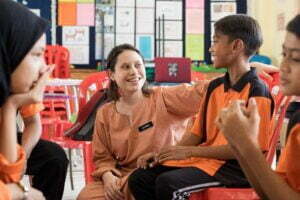“Being in Semporna really helped me understand Sabah better. I am Sabahan and grew up in Kota Kinabalu but did not know much about the east coast of Sabah. I did not have the context to understand the breadth and depth of inequity that exists in my home state.
My first glimpse into the severity of education inequity that exists in Sabah was teaching English in the ‘last’ Form 4 class in my first year of the Fellowship. Out of the 35 students in the class, only 2 could possibly read in English, but most could recognise letters and read in BM. One particular boy, however, stood out. He was tall, loud, and had a perpetual smile on his face, even while getting scolded for escaping class. But he also stood out because he could not recognise letters other than ‘a’, ‘b’, and ‘c’. Whenever I would write the day and date on the board, he would take the longest to finish because he was copying the shape of the letters without actually understanding which letter he was writing down.
After a few classes of trying to gauge his ability, I finally just pulled him aside one day after class, with the excuse of asking him to help me with my books, and asked him point blank, “Teacher mau tanya, dan jawab dengan jujur ya, kamu kenal huruf? Jangan risau teacher tidak akan marah”
He finally said, “Tidak pandai, teacher”.
And that’s when my journey of trying to convince this boy to come for one-on-one extra classes to help him learn to read began. I would approach him after every single class I had with the class, to ask him, “Kamu free ka petang ini? Jom kita buat kelas tambahan?” and he would say “Jom Teacher!” but then wouldn’t show up. After multiple no shows and talking to the other English teachers, I realised he was feeling embarrassed and that was becoming a barrier to him taking me up on my offer. Eventually, after convincing him that I would let him listen to music on my laptop during extra classes, he showed up and we had our first literacy lesson together.

To cut a long story short, I, unfortunately, was only able to have 2 lessons with him; he was suspended from school due to a disciplinary case and didn’t come back to school until the next year. But I will always remember this boy, who would smile so brightly and sing in class, but also didn’t believe in anyone around him enough to seek the help he so desperately needed.
I left Semporna with the strongest conviction that a good education is not one that prepares you to pass or get an A in an exam. A good education is one that prepares you for the world that you will live in. A good education is one that leaves you with the confidence to ask for help when you need it and the knowledge to know where to go to find it.”






